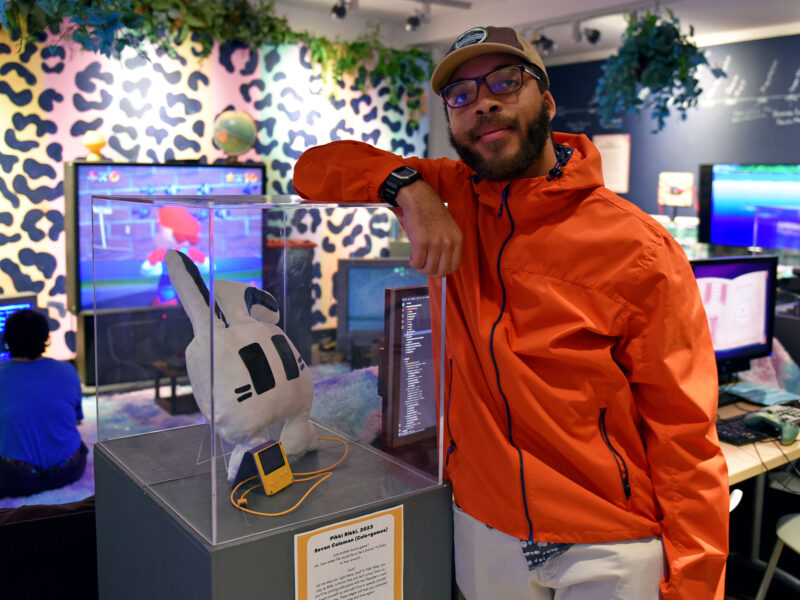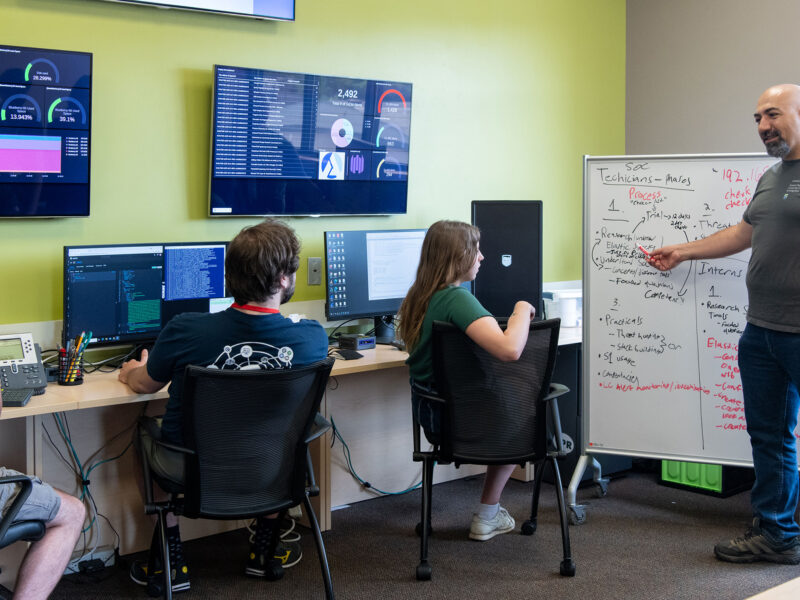Roland Palmer ’90 On His Champlain Journey, Giving Back, and Passionate Professors

The Champlain community is filled with caring, dedicated people, and Roland Palmer ’90 is one of those people. In this Q&A, Palmer looks back at his Champlain journey from student to alumni and his 17-year career at Champlain College.
Palmer attended Champlain when we were a two-year institution, and he’s seen us grow and transform in big ways. He serves in the role of Director of Engagement & Operations in our Office of Advancement.
How did you first hear about Champlain?
I was a student enrolled at the University of Vermont, and I really didn’t like it. In my first year, I was in a class that had 150 students in it. It was totally overwhelming. At the time, Champlain was doing radio ads about its Upside-Down Curriculum. They advertised that Champlain College was the place for you if you knew what you wanted to do. I had been working while in school, and that appealed to me. In my sophomore year at UVM, I wasn’t taking any classes in my major yet, and I kept hearing the Champlain radio ads every day. I finally decided to check it out, so I stopped by Champlain and talked to someone about transferring.
What drew you to Champlain for your Associate’s degree?
The big draw for me was that while in school, I had already started my career in management. Champlain’s model promised career-focused education, which appealed to me. I started classes that summer. I hadn’t taken many classes in my major yet, so I had to catch up. After loading up my schedule, I was able to graduate in a year: the spring of 1990. I really loved Champlain. My classes were smaller, and I had great access to my professors. If I ever needed something, I could always get in front of someone and ask questions. The size and feel of the school was perfect.

What was your major?
My major was Computers & Management. It was almost like a dual major in computer science and business management. Half my classes were related to business, and the other half were computer science, which I thought would be an important skill to learn. However, my experience at Champlain showed me that I couldn’t imagine myself sitting at a desk for hours coding. Those classes pushed me firmly in the direction of management.
What was Champlain like as a two-year institution?
The school was smaller, not quite as many students as we have now. Many of the buildings are the same, but we have more now. Most of my classes were in Joyce and Skiff halls. I was a commuter student, but there were still residential students. It was also one of the last years of Champlain as a two-year institution. What I had learned at Champlain benefitted my career, and I returned to the workforce.
What were your favorite memories from your time at Champlain as a student?
I was able to develop close relationships with my professors. Thane Butt, who is now retired, had difficult classes. She was the kind of professor who handed out the syllabus on the first day and said that within a few weeks, there wouldn’t be as many people in the class. I thought it was going to be tough, which it was. I ended up getting an A in that class and was pretty proud of myself. The professor who taught my marketing class liked that I had been out in the workforce and could bring real-world experience to the class. It was good to have that perspective in the classroom because Champlain is so career-focused.
After you graduated, what was your journey back to Champlain?
My job throughout college was as an assistant manager at a bookstore in the University Mall. I had worked my way up to assistant manager, but I wanted to be a manager. I loved working there, but after about 10 years of working long hours and holidays, I wanted something different and more challenging. I saw an ad in the paper for The Lead Sheet, a small family-owned company in Winooski that collected and sold information on new businesses. They were a very profitable company and were looking for a data acquisition manager. They liked me, and even though I didn’t have much experience, I got hired.
Within five years of being at the company, I had helped them reach over $2 million in sales. I really liked the company because it always felt like a family. As this company grew, it caught the attention of a much larger database company who eventually bought the company and unfortunately closed us down. I consulted with the new company for a year and then got a call from the son of the previous owner of the Lead Sheet who wanted to start a graphic and website design company and he needed a business manager. Vermont Design Works was established with just four people. I worked there until 2006, when I saw an ad in the paper for an open position at Champlain College for the Director of Advancement Operations.
I thought, ‘what the heck?’ I would love to go back and work for Champlain. I did three long interviews and met all the teams. It turned out that my boss, who was hiring me at Champlain, knew the family I had previously worked for. So, she immediately went to them for a reference.
I had never worked in higher education before, but I felt I had a solid background to be successful in the position.
I love working at Champlain because there is a real sense of family. We care about each other. I’ve been here for 17 years and am looking forward to 20 years, which will be a big milestone.

Roland Palmer ’90 at Champlain Weekend, a time to bring alumni and families together to celebrate all things Champlain each fall.
What do you think makes Champlain so special?
The community. The people here are all super focused. They know the reason we’re here is to help students achieve a higher education, get their degrees, and find amazing jobs. I think we really do a good job of that. The faculty and staff care about the work we are doing. The Advancement team really sees the impact of what we do every day. I have never felt like just a cog in a machine. It’s important for me in my career to feel like I am making a difference, and at Champlain, I feel that.
You have made gifts to the college. Why do you choose to support Champlain?
When I went to that first meeting in Skiff Hall, they ran all the numbers and told me what it would cost to transfer to Champlain. At the time, I was living on my own, and when they told me how much it would cost, I could only come up with some of the money, not all of it. They ran the financial aid numbers and said they could help fill the gap by giving me a Support-A-Student Scholarship. Getting that scholarship meant so much to me. I was so glad I chose to transfer to Champlain that I started donating to the Support-A-Student Scholarship Fund after I graduated. I’ve given to Champlain ever since. Luckily, I have been successful in my career, so my contributions have increased. I knew that even if I gave them $50, it would go toward another student in the same situation I was in. Every little bit helps. While those larger donations are amazing and transformative, we need the steady, smaller numbers, too. I’ve always been happy to give back to Champlain.
Why do you think others should also give to Champlain?
Everyone’s philanthropy is different. Looking back on my career, I attribute so much of what I learned to Champlain. To me, it just makes sense that I should be supporting them with a donation. Everyone’s experience at Champlain is unique, but I know many people have the same reaction as me. It’s about thinking beyond yourself and helping the next generation of students. I know there are students out there who want to come to Champlain, but without the financial aid they received it wouldn’t be possible. So, a lot of what we do in Advancement is ensuring that as many students as possible can get financial aid and come to Champlain. I hope that if other people are giving and making their donations, it makes them feel awesome because it really does help.

How would you encourage others to stay connected with Champlain?
There are multiple ways you can be connected: making donations, attending events like Champlain Weekend, and more. We try to make people feel connected and get them back to campus. We know that not everyone can, so the team does a lot of traveling to bring Champlain to people around the country. We want to show our alumni base that Champlain is still going strong and that we want people to be a part of that. It’s about always having the door open.
What excited you about the future of Champlain?
I’m excited about our current president, Alex Hernandez. He is a very different president than we’ve ever had before. He has a vision to move us forward; he likes to get things done and is so passionate. He’s someone who shows his emotions, and you don’t always see that in a leader. You can tell he truly cares.
There’s a lot that Champlain has to offer. We are attracting students not just from our community and region but from all over the country and world. Champlain has to continue delivering quality education and ensure that after graduation, our students get into the workforce with amazing jobs.
Author
More Inside The View
Ideas
From the minds of our students, faculty, and alumni.
News
The latest from Champlain College.
People
Champlain is more than just a place; it's a community.
Places
On campus, in Burlington, and beyond.
Events
Check out our many campus events and get involved! Refine your search by using the filters or monthly view options.


